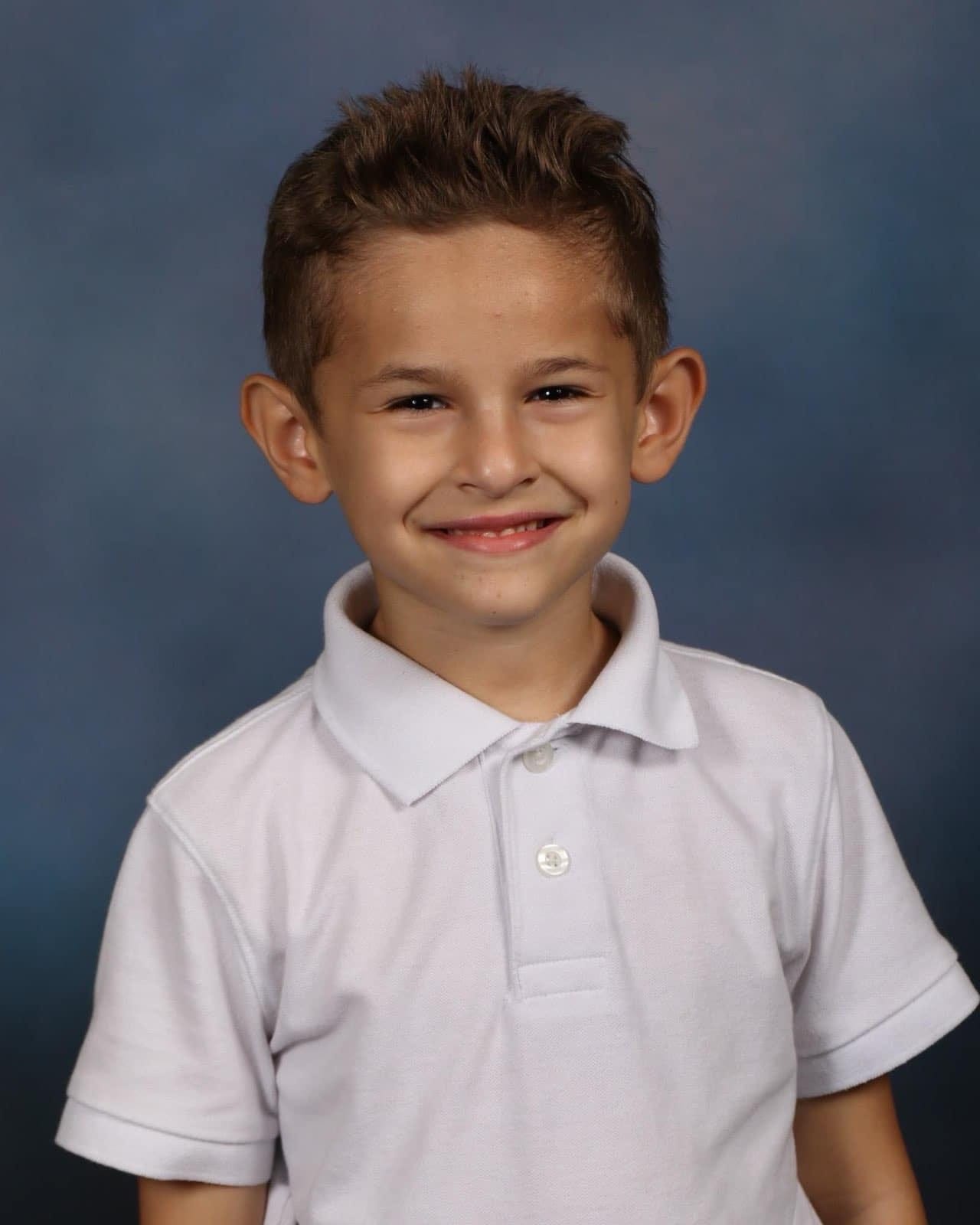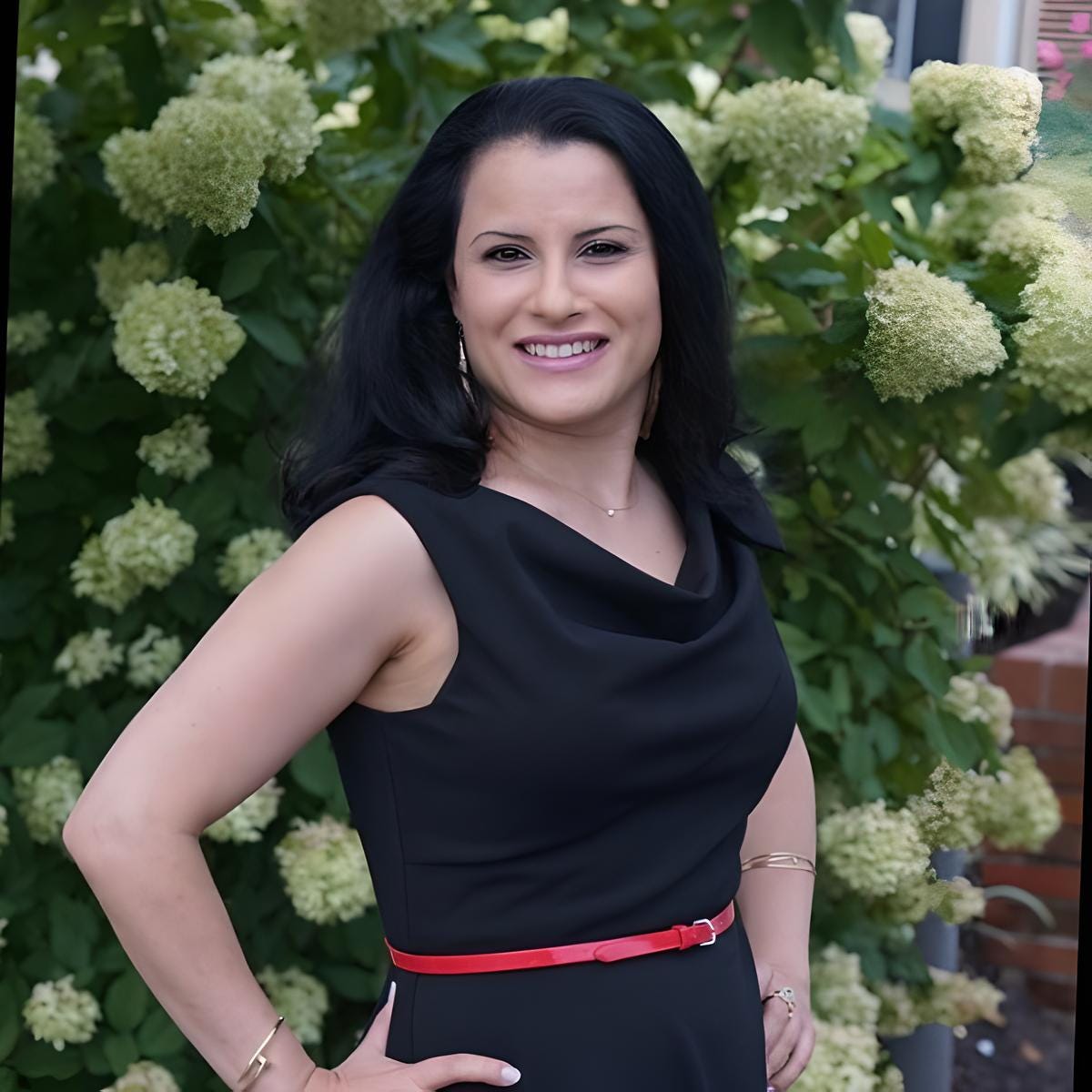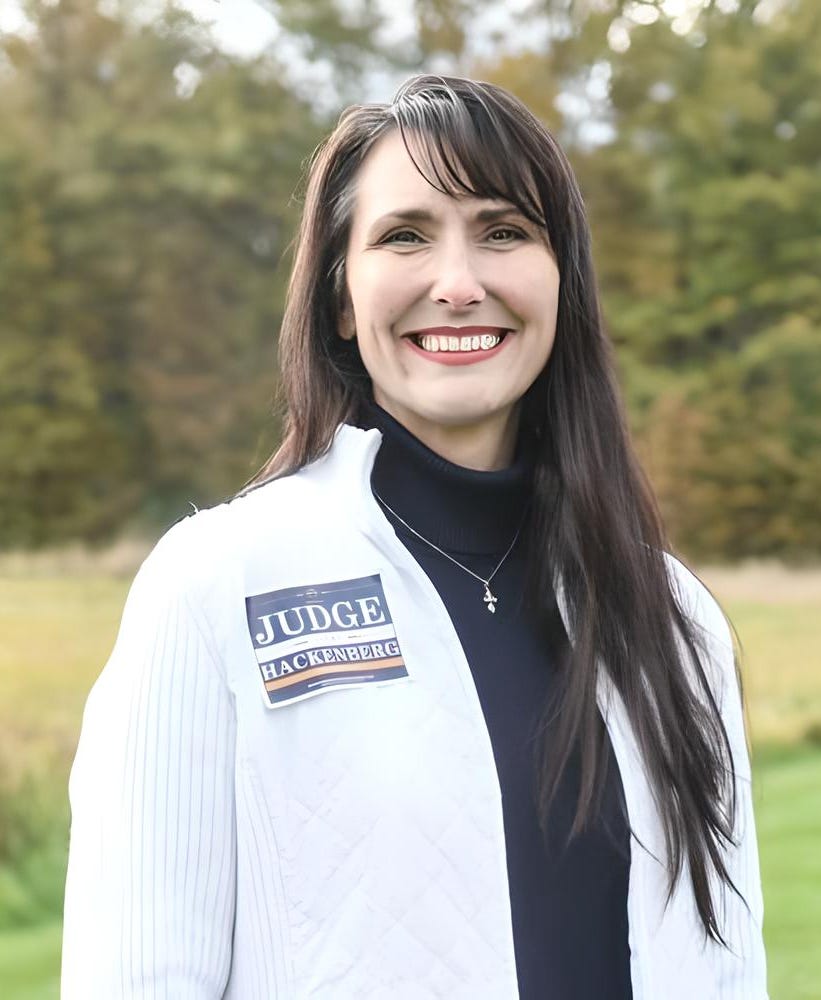Courtroom Corruption? Grieving Mom Accuses Judge of 'Cash-For-Kids' Scandal
How a Custody Dispute Turned Deadly for Six-Year-Old Adam Gitter

By Richard Luthmann
Six-year-old Adam Gitter was smart, kind, loving, caring, adorable, and funny. Earlier this month, he was pronounced dead in a Lakeland, Florida, hospital while in the custody of his father, Dr. Leonard J. Gitter, a local oncologist.
Elena Belogolovsky, the grieving mother, wants answers that have not been forthcoming. The local Polk County Sheriff and Lakeland Hospital have been tight-lipped about what happened.
But Belogolovsky says her son should never have been put in this dire position. She alleges a pattern of bias and corruption within the Snyder-Union County Family Court in Pennsylvania. Judge Lori R. Hackenberg’s string of outlandish decisions, including reliance on a “troubling” custody evaluation conducted by Harrisburg’s Dr. Arnold T. Shienvold, Ph.D., contributed to the circumstances leading to her son's untimely demise.
Adam's death came amidst a bitter custody dispute highlighting stark disparities in financial resources and parental treatment. The contentious legal struggle, Belogolovsky claims, favored her wealthier ex-husband due to alleged judicial bias.
Belogolovsky believes her son’s case is a stark example of “Cash-For-Kids” in the Family Courts. It raises important issues around the need for transparency, fairness, and accountability in a judicial process that purportedly prioritizes children's welfare above all else.
A Custody Battle Turns Tragic

The heated custody dispute between Belogolovsky and her ex-husband, Leonard J. Gitter, an affluent medical doctor based in Lakeland, Florida, began five months after Adam’s birth. The Pennsylvania Family Court initially awarded Belogolovsky primary physical custody. But as the legal battle unfolded, it exposed the personal animosities between the two parents and the stark disparities in their financial resources and social standing.
Belogolovsky, a former academic with credentials from Cornell University and Lycoming College, found herself pitted against her well-established oncologist ex-husband, a dynamic that she claims significantly influenced the Family Court.
The legal battle was marked by a series of decisions that Belogolovsky contends heavily favored Dr. Gitter, largely due to his superior financial standing and resources. She describes a situation where the scales of justice seemed to tilt in favor of wealth and influence.
Belogolovsky says Judge Hackenberg systematically disadvantaged her while favoring her wealthier ex-husband. She contends that the judge's rulings, particularly the custody “flip” based on the custody evaluator, Dr. Arnold T. Shienvold’s report, placed her under extreme financial strain. Not only did she lose her son, but she was required to cover all costs associated with visiting him in Florida.
This Court directive came despite Belogolovsky’s challenging financial situation, highlighted by her unemployment status and contrasted starkly with Dr. Gitter's substantial income as a successful oncologist. She decries this decision as unfair and an impossible burden that severely limited her ability to maintain a regular and meaningful presence in her son's life.
A Mother's Heart-Wrenching Letter
Adam’s death pushed his mother to the brink of despair. She addressed the court in a manner intertwining her overwhelming grief with stark accusations directed at the legal system that she believes failed her and her son, as published on her LinkedIn page.
Belogolovsky lays bare the depth of her pain and the breadth of her anger and does not mince words in her condemnation. She labels Judge Hackenberg as a "child-murderer" — a stark and shocking characterization that underscores the depth of her conviction that the judge's decisions were directly responsible for Adam's untimely death:
I filed several emergency motions to change custody. The last one was in December 2023. Finally, after a few more emergency motions that I filed, which were ignored by Judge Hackenberg from union and Snyder counties, PA, she scheduled a pre-trial conference for March 6, 2024.
This is the email that I wrote to the deputy court administrator:Dear Mrs. Sees,
I regret to inform you that I will not be able to attend the hearing on March 6th. Instead, I find myself attending the funeral of my smart, kind, loving, caring, adorable, and funny son, Adam. He had not even reached his seventh year when his life was tragically cut short by the actions of Judge Hackenberg.
The gravity of Judge Hackenberg's actions transcends mere negligence; they constitute a heinous crime. Instead of deciding the fates of our children, she should be facing the consequences of her actions behind bars. This is not only a matter of personal tragedy but a call for justice that echoes through our community.
Judge Hackenberg's continued presence as a decision-maker in the lives of children poses a clear and present danger to not only my family but the entire community. The ominous truth is that the next victim could very well be someone close to you. Her position of authority has become a threat to our world – she is a child-murderer whose actions demand immediate accountability.
During the April 12, 2022 hearing, I directly confronted Judge Hackenberg with a stark truth, as recorded on page 79 of the transcript: "We know how it all ends all the time." Despite this explicit warning, her insatiable greed and egomaniacal nature propelled her actions beyond control. It is disheartening that many individuals cc’ed in this email witnessed her actions and chose silence, allowing the unfolding tragedy to stain all involved with the blood of my perfect and incredible child, Adam.
If any shred of decency remains within those who receive this message and they do not wish to bear the burden of another child's blood on their hands, I implore them to speak up.
Sincerely,
Adam’s Mother forever
CC:
Kelly Heeter, Court Administrator, kheeter@SnyderCounty.org
Sue Sees, Deputy Court Administrator, SSees@UnionCo.org
Roseann Stetler, Judge’s Administrative Assistant, rstetler@unionco.org
Faith Culp, Court Reporter, fculp@unionco.org
Erin McCarthy, GTS Coordinator/Custody Hear & Arbitration Scheduler, emccarthy@unionco.org
Sarah Stigerwalt-Egan, Law Clerk/Custody/Divorce Hearing Officer, sstigerwaltegan@unionco.org
Susan Greene, Chief Clerk Administrator, sgreene@unionco.org
Darren Holst, Plaintiff’s counsel, dholst@hkhlaw.net
Belogolovsky included these hashtags in the post: #CourtCorruption #StandUpForJustice #EndJudicialAbuse #SaveKids #KidsForCash #FamilyCourt #ImpeachJudgeLoriHackenberg
The Custody Evaluator’s Report
Central to Belogolovsky's grievances was the role of the custody evaluator, Dr. Arnold T. Shienvold, whose assessment would prove pivotal in the shifting dynamics of the custody arrangement. The report, she alleges, was fundamentally flawed and biased, contributing significantly to the court’s decision to transfer custody to Dr. Gitter abruptly. Belogolovsky goes further, insinuating that the evaluation was not just biased but potentially "bought and paid for," a damning indictment that suggests a deeply corrupted process.
Dr. Arnold Shienvold has been a psychologist for over 40 years and is often called to assess families for the court system. He holds some controversial opinions related to the Family Court arena. He admits there are varying degrees of parental alienation but denies that it is a medical disorder.
“The problem with labeling it as a syndrome is it doesn’t always happen. When you think about a medical syndrome, you think about a certain toxin. Whether it’s bacterial or viral, if someone is exposed to it, they always end up with the disease. In alienation, you can have two children within the same environment, exposed to the same exact stimulus, and one becomes alienated, and one doesn’t, so why would that be the case if it was a syndrome,” said Shienvold in a 2019 interview. “I think its much more important to see it as a family relational problem than it is to label it a syndrome.”
Dr. Shienvold is poorly rated on several MD informational websites. He is alleged to be a “woman hater” and a “corrupt, biased, and unethical child custody evaluator” who “follows the money, not the law.”
One reviewer said:
RUN from this man! He is corrupt, unethical, and incompetent. He recommends custody to fathers, ignores facts, and lies on the stand in open court.
There are dozens of mothers who lost a primary or any custody of their kids because of this man. He shouldn't be allowed to practice.
Another reviewer said this:
This man committed perjury on the stand in custody cases for cash, he is colluding with attorneys to remove custody from safe parents. This evil man’s unregulated practice has resulted in a child homicide. We demand the immediate investigation into this criminal.
And yet another reviewer said this:
I've now connected with nearly a dozen women who have lost partial or total custody of their children due to Arnold Shienvold. I'm sure there are many more out there.
Shienvold’s evaluations appear to be filled with gender bias (against mothers) and worsen if a mother brings up abuse (of herself or children), thus bearing out Joan Meier's findings in her study on custody outcomes and abuse allegations in which mothers are more likely to lose custody if they speak of abuse and even more likely if father invokes "alienation" (to read: https://papers.ssrn.com/sol3/papers.cfm?abstract_id=3448062).
We victims of Arnold Shienvold found that Shienvold made myriad factual errors in all of our evaluations, from places of birth, ages, dates, languages spoken, family history, employment, and much more.
Worse than the errors he made, we found his evaluations steeped in gender discrimination and more favorable to fathers across the board. In many instances, fathers' words were consistently presented as unquestioned fact and mothers' at "allegations" and "claims." In many cases, women were not given an opportunity to address the allegations and claims made by their former spouses, many of which were outlandish. Shienvold seems unaware that bizarre allegations (like Muchausen-by-proxy) or filing for sole custody are more common among abusers; these should be red flags for any evaluator.
Arnold Shienvold monetizes women's trauma and furthermore, he medicalizes it, consistently denying abuse allegations while suggesting women who have experienced physical, psychological, financial, verbal abuse and coercive control at the hands of their children’s fathers are not traumatized, but rather mentally unwell or unfit to parent. He seems to have no understanding that women undergoing an evaluation in which they may lose custody to their or their child’s abuser might be stressed in a variety of ways.
I do not make these accusations lightly. In comparing evaluations, we victims of Shienvold were horrified. It appears he is copying and pasting data from one evaluation to the next and he is extremely careless both in his evaluation process (which is lengthy and expensive) and write up. It appears he systematically discriminates against women. Arnold Shienvold regularly denies abuse in his evaluations and is not trauma-informed. We believe he consistently puts children in harms way. While he is not alone in this (we know that father's who want custody rarely lose custody), he is among the worst of his kind and yet has somehow positioned himself as an expert in this growing industry of divorce.
His proteges (his son, Kasey and Heather Green) are no better. While it is my understanding that some younger women in the AFCC (the professional organization of divorce professionals) are on to Shienvold, the organization at large lets him continue to train others. It’s truly shameful.
Unless you are an abusive man, a wealthy man, or a fathers’/men’s rights advocate, stay as far away from Shienvold and those he has “trained” as you can in order to protect yourself and your children.
This review really only hits a few of the concerns about Arnold Shienvold and co. Women, attorneys, children - be VERY careful. There is something VERY wrong with this practice and this individual.
Jill Jones Soderman is the Founder and Executive Director of the Foundation for Child Victims of the Family Courts (https://fcvfc.org/). FCVFC is an advocacy group that has worked tirelessly to expose Family Court Corruption, including “Evaluators and their evaluations.” She calls custody evaluators like Dr. Shienvold “psychopathic predators” who are immune from accountability and “have nothing to lose.”
In her most recent book, she writes:
The FCVFC is fully familiar with the cast of psychopathic predators who parade as licensed professionals. They are equal opportunity abusers who have no bias in taking money from men or women to slowly, painfully exsanguinate the lifeblood out of their victim - men, women, and children - probably separating platelets from other blood products for the highest rate of return…
[I]n order to verify whether or not you are a fit parent, the family cout has resorted to the ‘psychological evaluation’ given by an ‘evaluator.’…
[This person will make a recommendation as to custody, visitation, therapy, and even medication recommendations. The judge will most often listen to and follow those recommendations.
You will not be allowed to question the interpretation of the data. In many courts, you will not even know what it is, because it is kept confidential, even from you and your representatives…
Evaluators, acting in the place of law enforcement, forensic science, best interes, and best practices are replacing the fact-finding functions of the judge, as judges fully predicate their decision-making function to the evaluation report and associated recommendations.
The reports are written by judicial order and with judicial authority and are granted qualified immunity from any accountability concerning lawsuits. The authors of these life-altering reports have nothing to lose.
Belogolovsky's grievances extend beyond custody concerns, delving into what she perceives as a pervasive bias in the judicial process.
Accusations of Systemic Bias
Belogolovsky alleges that Judge Hackenberg consistently ignored or minimized evidence that could adversely affect Dr. Gitter’s standing, while seemingly magnifying any data that could be seen in his favor. She argues that this selective interpretation of evidence contributed to a skewed portrayal of the custody situation, ultimately influencing the judge's decision to transfer custody to Gitter.
Belogolovsky perceives a broader pattern of bias within the Family Court's proceedings. She suggests they are part of a systemic bias that favored the financially more powerful party and disregarded the child's best interests. She argues that the judge’s actions reflect a disturbing trend within certain elements of the Family Court system, where finances might overshadow the nuanced needs and well-being of the children at the heart of custody disputes.
The financial hardship imposed by Judge Hackenberg’s orders placed Belogolovsky in an untenable position, effectively restricting her ability to litigate on equal footing and contributing to a sense of powerlessness against a system she viewed as rigged against her. This, she asserts, led to an unjust shift in custody, with Adam being moved away from his mother and into a situation that she feared was not in his best interest.
If true, Belogolovsky’s claims point to a systemic failure that extends beyond her individual case, suggesting that the mechanisms designed to protect children and ensure their welfare may be susceptible to manipulation.
Earlier this month, the legal skirmishes and strategic maneuverings culminated tragically with the sudden and as of yet unexplained death of young Adam while in his father's care in Florida. This devastating turn transformed what was already a fraught legal and emotional conflict into a somber tale of loss, raising urgent questions about the decisions that led to this outcome.
The Fallout of Judicial Decisions

The heart of Elena Belogolovsky's case against Judge Lori R. Hackenberg and Dr. Arnold T. Shienvold lies in what she perceives as a series of flawed judicial decisions based on untrue and dangerous speculations in the custody evaluator’s report. The miscues were more than simple mistakes and had far-reaching consequences, both personally and legally.
Her charges against the judge are multifaceted, encompassing allegations of selective evidence review, the application of double standards, and a fundamental disregard for the best interests of her son, Adam.
Belogolovsky asserts Judge Hackenberg’s approach distorted the factual landscape of the custody battle, leading to decisions that were not based on a balanced or fair assessment of the situation. The accusations do not stop at selective evidence review. Belogolovsky also claims that Judge Hackenberg applied double standards in evaluating the conduct and circumstances of the two parents. She contends that her actions and character were subjected to intense scrutiny and interpreted unfavorably, while Dr. Gitter's behavior was either excused or viewed more sympathetically.
This perceived bias in judicial treatment undermined the fairness of the proceedings and, according to Belogolovsky, compromised her ability to litigate effectively and advocate for her son's welfare. Crucially, Belogolovsky believes these judicial decisions failed to prioritize Adam's best interests. She argues that the outcome of the custody battle — the relocation of Adam to Florida under his father's care — was not in line with what would have been best for his emotional and physical well-being. The shift in custody, predicated on decisions she deems unjust and biased, removed Adam from his established environment and placed him into a situation that she feared was detrimental to his health and happiness.
The fallout from these judicial decisions was not abstract legal defeats but tangible losses: a mother's diminished capacity to protect and be with her child and, ultimately, a young boy's untimely death under mysterious circumstances.
Raising Alarm: A System in Crisis?
Belogolovsky’s claims raise crucial questions about the Family Court system's susceptibility to external influences, particularly the influence of wealth. In Adam's case, the stark disparity in financial resources between Belogolovsky, a once-employed academic, and her ex-husband, Dr. Leonard J. Gitter, a well-off oncologist, seemingly played a pivotal role in the court's decisions. This situation prompts a critical inquiry: Are financial power and social status unduly shaping legal outcomes, compromising the fairness principle that should underpin the justice system?
Moreover, the dynamics of Belogolovsky's legal battle spotlight another distressing concern: the potential for systematic disadvantage based on gender or financial status. Her accusations suggest that the Family Court system, as exemplified by her interactions with Judge Hackenberg, may be predisposed to favor those with greater financial clout, irrespective of the child's best interests or the equitable rights of both parents. This undermines the judiciary's credibility and poses serious implications for gender equity within legal proceedings.
Belogolovsky's narrative taps into anxieties about the Family Courts' fairness and impartiality. It compels society to confront uncomfortable questions about whether these critical institutions serve the best interests of children and families or whether they have become arenas where financial and social inequalities can dictate judicial outcomes.
The alarm raised by Adam Gitter's case extends beyond the personal grievances of a bereaved mother; it challenges participants, community leaders, advocates, legal practitioners, lawmakers, and the general public to scrutinize the mechanisms and principles guiding Family Court proceedings. Only a comprehensive, frank, and unbiased evaluation of the Family Court system can fully reveal many areas of immense concern.
The institutional authority of any court is built upon the public’s perception of integrity and fairness. Shamefully, American Family Courts have become synonymous with corruption, bias, and undue influence. Hopefully, we will not endure another tragedy like the needless death of six-year-old Adam Gitter before we see meaningful changes to protect the best interests of our children.










Richard Luthmann, thank you for sharing this story and raising awareness. I am determined to seek justice for my child and prevent further tragedies caused by the greed, corruption, and egotism of judges, lawyers, and psychologists.
#JusticeForOurChildren
#JusticeforAdamJonathanGitter
#ImpeachJudgeLoriHackenberg
Please sign this petition:
https://www.change.org/p/petition-for-justice-prosecute-arnold-shienvold-custody-evaluator-for-ethical-violation